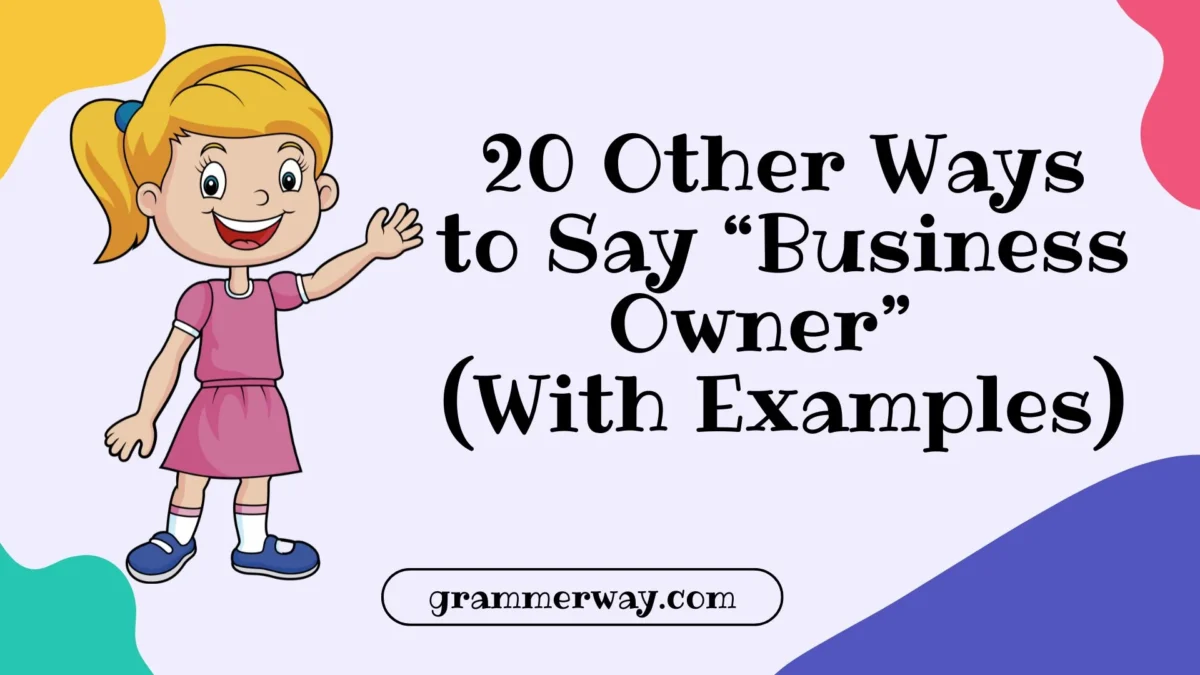Finding the right way to describe a business owner can make your communication feel more professional, warm, and meaningful. Whether you’re writing a formal email, introducing someone, or crafting a message for social media, using the right words helps you express respect, care, and appreciation for someone’s work and achievements. In this guide, you’ll discover 20 other ways to say “Business Owner”, along with examples, tone, and detailed explanations to help you use them naturally.
What Does “Business Owner” Mean?
A business owner is someone who starts, manages, and takes responsibility for a business or company. They handle important decisions, take financial risks, and often play multiple roles to make sure their business runs successfully. This term is commonly used in both formal and informal settings to describe people who own and operate a business.
Is It Professional or Polite to Say “Business Owner”?
Yes, it is both professional and polite to say “business owner.” However, using alternative terms can sometimes sound more specific, refined, or personally thoughtful, especially when you want to highlight someone’s leadership, creativity, or success. Choosing the right synonym can make your message sound more tailored and respectful.
1. Entrepreneur
Scenario: Use when referring to someone who creates and runs a business, often with innovation or risk-taking involved.
Meaning: A person who starts and builds a business with creativity, passion, and initiative.
Examples:
- She’s an entrepreneur with a passion for sustainable fashion.
- Every entrepreneur knows that success takes patience and courage.
- He’s a young entrepreneur changing how people see online education.
- As an entrepreneur, she focuses on solving real-world problems.
- Many successful entrepreneurs started with a simple idea and strong determination.
Tone: Professional, inspiring, respectful.
Explanation: The word entrepreneur emphasizes innovation and vision. It shows admiration for someone’s creativity, courage, and leadership in starting a business. It’s widely used in formal writing and motivational contexts.
2. Founder
Scenario: Perfect when you’re talking about the person who started a business or organization.
Meaning: The individual who establishes or creates a company or brand.
Examples:
- She’s the founder of a growing digital marketing agency.
- The founder believed in empowering small local businesses.
- As the founder, he shaped the company’s mission and culture.
- Our founder started with one laptop and a dream.
- They celebrated the founder’s contribution to the company’s success.
Tone: Professional, respectful, formal.
Explanation: The term founder highlights someone’s initiative and leadership. It works well in both corporate bios and public introductions, showing respect for the person who started the business.
3. Proprietor
Scenario: Often used for small or family-run businesses like shops, cafés, or local services.
Meaning: A person who owns and manages a small business or establishment.
Examples:
- The proprietor welcomed every guest with a warm smile.
- She’s the proprietor of a charming little bookstore downtown.
- As the proprietor, he ensures quality in every detail.
- The proprietor’s attention to service makes the shop special.
- Local proprietors are the heart of every community.
Tone: Polite, classic, slightly formal.
Explanation: Proprietor gives a traditional, elegant touch. It shows respect for someone running their own small business and adds a feeling of personal connection.
4. CEO (Chief Executive Officer)
Scenario: Use in a corporate or professional setting to show authority and leadership.
Meaning: The highest-ranking person in a company responsible for making major decisions.
Examples:
- He’s the CEO of a fast-growing tech startup.
- The CEO leads with vision and strong values.
- As CEO, she manages both strategy and growth.
- Our CEO believes teamwork drives innovation.
- The CEO’s leadership transformed the company culture.
Tone: Formal, authoritative, respectful.
Explanation: The term CEO conveys professionalism and prestige. It’s suitable for official communication, media interviews, or business profiles where formality matters.
5. Business Founder
Scenario: Ideal when you want to combine ownership and creation in one phrase.
Meaning: Someone who both owns and started their business.
Examples:
- She’s a proud business founder and mentor for young women.
- Every business founder starts with a unique dream.
- The business founder shared insights on growth and teamwork.
- He became a business founder after years in corporate life.
- Successful business founders balance passion with practicality.
Tone: Professional, warm, motivational.
Explanation: This phrase feels relatable and modern, suitable for professional bios or interviews. It highlights both initiative and ownership.
6. Company Owner
Scenario: Common in general business discussions or formal introductions.
Meaning: A person who owns a company and is responsible for its overall direction.
Examples:
- The company owner values ethical business practices.
- As the company owner, she leads with empathy and strategy.
- The company owner made thoughtful decisions for the team’s success.
- He’s a respected company owner in the construction industry.
- The company owner’s vision shaped their brand identity.
Tone: Neutral, professional, straightforward.
Explanation: Simple yet professional, company owner works in both formal and conversational settings. It emphasizes responsibility and leadership without sounding overly corporate.
7. Managing Director
Scenario: Used for leaders who oversee business operations daily.
Meaning: Someone who manages and directs all parts of a company.
Examples:
- She’s the Managing Director of a creative design firm.
- The Managing Director handles both client and staff relations.
- Every Managing Director must balance people and performance.
- As Managing Director, he ensures smooth business growth.
- The Managing Director’s decisions influence company culture.
Tone: Formal, respectful, executive-level.
Explanation: Managing Director adds a touch of authority and professionalism, suitable for larger companies or leadership profiles.
8. Owner-Operator
Scenario: Ideal for someone who owns and personally manages their business operations daily.
Meaning: A person who not only owns the business but also runs it actively.
Examples:
- As an owner-operator, she personally ensures top-quality service every day.
- Many small cafés are run by passionate owner-operators.
- The owner-operator of the company manages both sales and operations.
- Being an owner-operator means wearing many hats at once.
- The owner-operator’s dedication makes the business feel authentic and reliable.
Tone: Professional, hands-on, authentic.
Explanation: The phrase owner-operator adds a feeling of personal involvement and commitment. It’s perfect for small or medium-sized businesses where the owner plays an active role.
9. Sole Trader
Scenario: Common in countries like the UK, Australia, and New Zealand for small business owners.
Meaning: Someone who owns and operates a business independently without partners.
Examples:
- As a sole trader, he handles every part of the business himself.
- Many sole traders enjoy the freedom of working on their own terms.
- She started as a sole trader and later expanded into a company.
- Being a sole trader taught him valuable lessons about management.
- The sole trader model suits people who prefer independence.
Tone: Formal, self-reliant, simple.
Explanation: Sole trader emphasizes independence and control, suitable for freelancers, local shop owners, or small entrepreneurs working solo.
10. Business Leader
Scenario: Use for people who inspire and guide others in business growth and innovation.
Meaning: A person who leads a business or organization through vision and influence.
Examples:
- She’s a respected business leader in the tech industry.
- Every great business leader values teamwork and ethics.
- The business leader inspired others to dream bigger.
- As a business leader, he drives innovation through creativity.
- Many business leaders mentor the next generation of entrepreneurs.
Tone: Motivational, professional, visionary.
Explanation: The phrase business leader highlights leadership and influence rather than ownership. It’s great when you want to focus on someone’s impact and guidance.
11. Entrepreneurial Mind
Scenario: Ideal when praising someone’s creative thinking or business mindset.
Meaning: A person with a strong ability to identify opportunities and build new ventures.
Examples:
- She has an entrepreneurial mind that always finds innovative solutions.
- His entrepreneurial mind drives him to turn challenges into opportunities.
- Every entrepreneurial mind seeks to create something meaningful.
- The entrepreneurial mind never stops thinking about improvement.
- That entrepreneurial mind built a successful brand from scratch.
Tone: Encouraging, thoughtful, appreciative.
Explanation: This term highlights creativity, innovation, and courage, suitable for describing people who think like business owners even if they don’t formally own a company.
12. Founder and CEO
Scenario: Best for modern startups and corporate introductions.
Meaning: A person who both started and now leads a business as its chief executive.
Examples:
- She’s the Founder and CEO of a global digital agency.
- The Founder and CEO shared his journey from idea to success.
- Every Founder and CEO balances vision with responsibility.
- The Founder and CEO’s decisions shape the company culture.
- As Founder and CEO, he inspires his team through action and purpose.
Tone: Professional, modern, powerful.
Explanation: Combining both founder and CEO creates a sense of ownership and authority, making it ideal for profiles, business cards, or formal documents.
13. Business Partner
Scenario: Used when someone co-owns or collaborates in a business with others.
Meaning: A person who shares ownership, responsibility, and profit in a business.
Examples:
- He’s my business partner in our marketing agency.
- Every business partner brings unique skills to the team.
- She met her business partner through a startup event.
- Their business partnership grew stronger over the years.
- A good business partner always supports mutual goals.
Tone: Collaborative, friendly, respectful.
Explanation: The term emphasizes teamwork and shared success, great for co-owned companies or professional collaborations.
14. Company Founder
Scenario: Perfect for describing someone who started a registered company or organization.
Meaning: The person who legally formed and built a business from the ground up.
Examples:
- The company founder had a vision for sustainable energy solutions.
- As the company founder, she oversees every new innovation.
- The company founder’s story inspired young entrepreneurs.
- Every company founder begins with courage and belief.
- He’s a proud company founder and community leader.
Tone: Professional, visionary, respectful.
Explanation: Company founder sounds formal and specific, perfect for bios, press releases, or official introductions.
15. Business Executive
Scenario: Ideal for describing someone managing or owning a larger business operation.
Meaning: A senior-level person responsible for making business decisions and strategies.
Examples:
- The business executive handled the company’s global expansion.
- As a business executive, he values both profit and people.
- The business executive worked closely with the leadership team.
- Many business executives began their careers as entrepreneurs.
- She’s a talented business executive with years of leadership experience.
Tone: Corporate, professional, authoritative.
Explanation: This title adds a sense of leadership and professionalism, ideal for larger organizations or corporate environments.
16. Franchise Owner
Scenario: Used when someone owns a franchise business under a larger brand.
Meaning: A person who owns and runs a local branch of a franchised company.
Examples:
- He’s a successful franchise owner with three restaurants.
- Every franchise owner follows the company’s core values.
- The franchise owner focuses on community engagement.
- As a franchise owner, she manages both staff and operations.
- The franchise owner’s hard work ensures brand consistency.
Tone: Professional, practical, respectful.
Explanation: Franchise owner shows responsibility within a larger system, perfect for those who operate businesses under known brands.
17. Business Operator
Scenario: When describing someone involved in day-to-day business management.
Meaning: A person responsible for running and maintaining business operations.
Examples:
- The business operator ensures everything runs smoothly.
- As a business operator, she focuses on customer satisfaction.
- The business operator must balance quality and cost daily.
- Every business operator values reliability and service.
- He’s a skilled business operator with years of experience.
Tone: Practical, respectful, professional.
Explanation: This term focuses on the operational and managerial side of business ownership, suitable for small or mid-sized business contexts.
18. Business Founder and Owner
Scenario: Great for describing someone who created and still owns their business.
Meaning: A person who started and continues to own and manage their company.
Examples:
- She’s the business founder and owner of a handmade jewelry brand.
- Every business founder and owner begins with an inspiring idea.
- The business founder and owner shared her growth journey online.
- As a business founder and owner, he’s deeply involved in every project.
- Successful business founders and owners inspire future entrepreneurs.
Tone: Professional, inspiring, complete.
Explanation: Combining both terms adds clarity and pride, suitable for official bios, websites, or press features.
19. Business Proprietor
Scenario: Works well for small, traditional, or local businesses.
Meaning: The individual who owns, manages, and controls their business operations.
Examples:
- The business proprietor greeted customers personally.
- Every business proprietor has a story of passion and dedication.
- As a business proprietor, he manages every detail with care.
- The business proprietor’s success came from community trust.
- Local business proprietors bring life to neighborhoods.
Tone: Polite, classic, traditional.
Explanation: Similar to “proprietor,” but adds more focus on the business itself. It feels formal yet approachable.
20. Small Business Owner
Scenario: Perfect when referring to individuals running independent or family businesses.
Meaning: A person who owns and operates a smaller-scale business independently.
Examples:
- She’s a passionate small business owner supporting local artisans.
- Every small business owner contributes to their community’s growth.
- The small business owner balanced work and creativity beautifully.
- As a small business owner, he manages every step of production.
- Many small business owners start from home-based setups.
Tone: Friendly, community-focused, warm.
Explanation: This term feels personal and relatable, perfect for marketing, storytelling, or local features highlighting independent brands.
Conclusion
Choosing the right way to say “Business Owner” helps you communicate with respect, accuracy, and warmth. Whether you’re writing a bio, sending a thank-you message, or highlighting someone’s story, these alternatives help you express genuine admiration and understanding. Each term has its own tone—from formal and professional to personal and friendly—so pick the one that best fits your context.
FAQs
1. What’s the best professional alternative to “Business Owner”?
The most professional alternatives are Entrepreneur, Founder, and CEO, as they reflect leadership and innovation.
2. Can I use “Entrepreneur” and “Business Owner” interchangeably?
Yes, but Entrepreneur often suggests innovation and risk-taking, while Business Owner is more general.
3. What’s a good casual way to say “Business Owner”?
You can say Small Business Owner, Owner-Operator, or Business Partner for a more personal and friendly tone.
4. Is “Proprietor” still commonly used?
Yes, though it’s slightly old-fashioned, it remains charming and polite, especially for local or traditional businesses.
5. Which alternative works best in a resume or LinkedIn profile?
Use Founder, CEO, or Business Executive to sound professional and credible in digital profiles.
Emma Brooke is a content writer at GrammerWay, specializing in English grammar, writing clarity, and common language errors. She creates easy-to-follow guides that help readers write accurately and confidently.







Leave a Comment